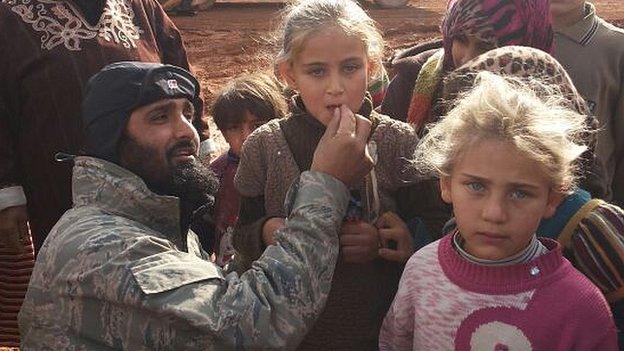Syria bomber from Crawley was a 'hero' says family
- Published
Abdul Waheed Majeed moments before his attack in February
The brother of a British man who blew himself up in Syria has told Newsnight he should be regarded as a hero who combated the regime, not a terrorist.
Abdul Waheed Majeed, of Crawley, died last month when he drove a truck bomb at the gates of Aleppo Prison.
His brother Hafeez said that his family wanted to challenge the idea that the attack represented a threat to the UK.
More than 30 people have been arrested this year as police step up operations to stop people fighting in Syria.
The government fears that some people going to fight in Syria against President Bashar al-Assad's regime will become radicalised and battle-hardened by joining al-Qaeda linked groups.
Security chiefs believe that hundreds of people have gone to fight in Syria and their return poses the greatest national security challenge since to the UK since 9/11.
But speaking exclusively to Newsnight, Hafeez Majeed said the government would be wrong to draw comparisons between his brother's death and threats to the UK. He said he believed the 41-year-old father-of-three died trying to save Syrian people who were being tortured in the Assad regime's prisons.
"If my brother had been a British soldier and there were British people in that prison and the act of heroism or bravery that he did, I know he would have been awarded the posthumous Victoria Cross," said Mr Majeed.

In the camps: Family say that Waheed Majeed went to deliver aid
"My brother was not a terrorist. My brother was a hero. My brother paid the full price with his life for what he did. He was not a threat to the British public and never has been a threat to the British public."
The father-of-three from Crawley travelled to Syria last July as a driver for a nationwide aid convoy, taking supplies to refugee camps along the border with Turkey. He spent six months in the region, sending his family regular reports of construction work he was undertaking to improve camp sanitation.
In January, he declined an opportunity to come home on a returning convoy. Mr Majeed said that his brother's wife and parents had urged him to leave Syria because he had done his humanitarian and religious duty in aiding victims of the war.
A few weeks later, he sent a last message home to friends and family saying that he would be out of contact for a while. On 6 February he died in the attack on Aleppo prison - which was led by Chechen fighters with the al-Nusra Front, a jihadist group affiliated with al-Qaeda.
After the death, the former leaders of al-Muhajiroun, a group long banned in the UK under terrorism laws, claimed that more than a decade ago Abdul Waheed Majeed had been a member of its prayer circle in Crawley.
But Hafeez Majeed insisted the link had been exaggerated, saying his brother had attended the group's talks like other young men from his generation.
"He'd been in contact with al-Muhajiroun," said Mr Majeed. "The views that they espoused did not marry with what his beliefs were. He stayed with them for a short time and then he moved on."
The full story of Abdul Waheed Majeed's life and death is on Newsnight, BBC Two at 2230 GMT.